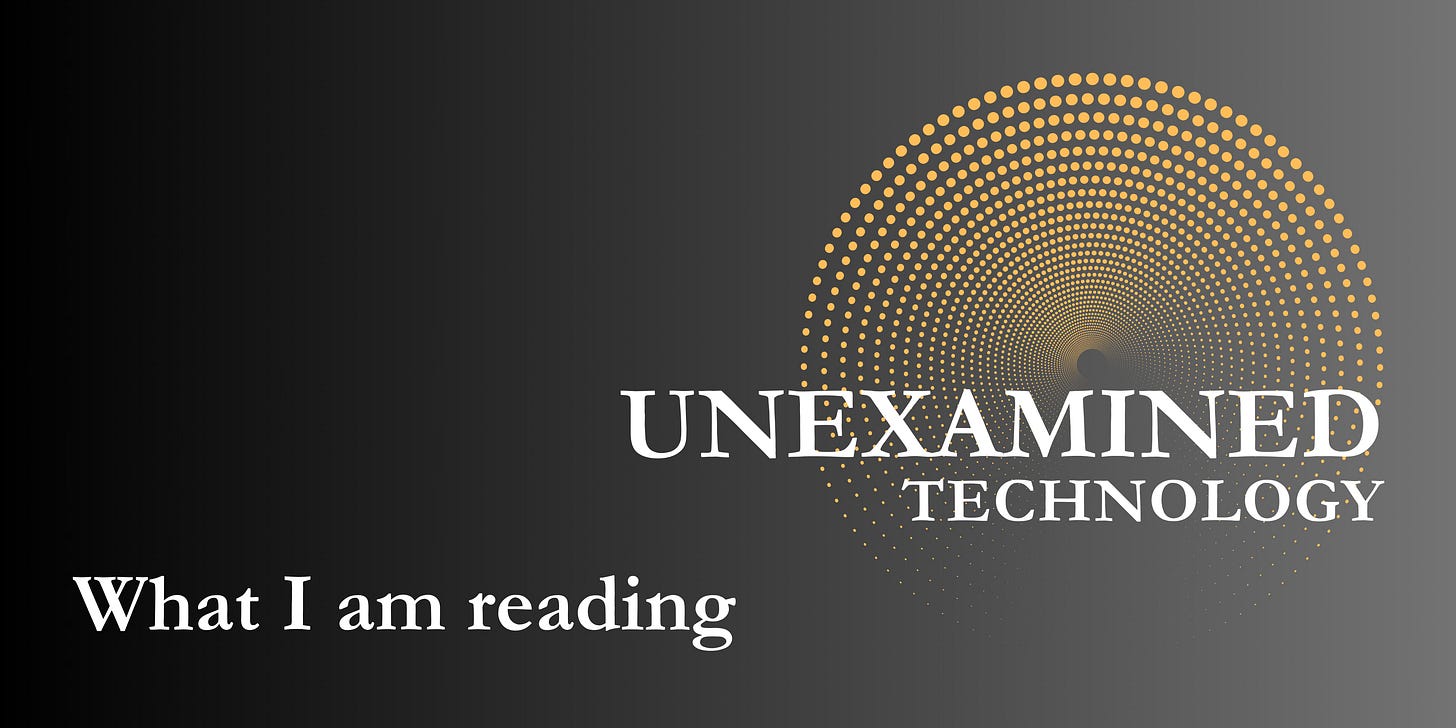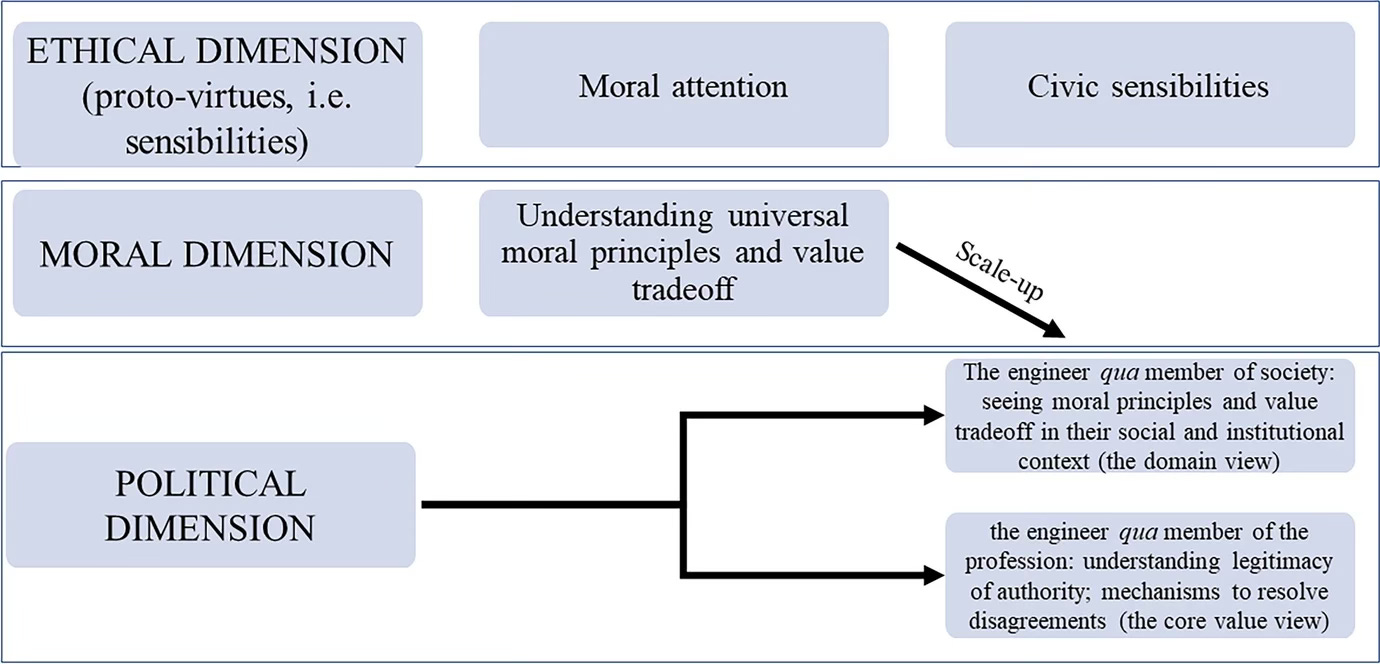Examined readings on technology: from awakened brains to ethics for engineering students
The Monday edition, March 4th, 2024
In the Monday edition of the newsletter I am sharing observations about books or articles I am currently reading or have recently finished. The Friday posts, such as the latest one on AI, are the longer essays inspired by the literature and other sources.
I am excellent at starting books, less good at finishing them — another book always begs starting! But I am also wary of quoting out of context, i.e. I hold it important to try to understand a book or an article in the broader body of work by the author (which takes time and effort!)
When possible, I will add the books to the Unexamined Technology page at bookshop.org with an affiliate link, i.e. if you purchase a book that way it helps me a little and independent bookstores even more. That’s for full disclosure. (The occasional Amazon link, when a book is not available elsewhere, is not affiliate.)
Pick’s for Monday, 11th of February 2024
Examined book of the week
Lisa Miller: The Awakened Brain: The Psychology of Spirituality
Miller, a neuroscientist, recounts her career path that has included several empirical studies on mental health patients and their avenues of recovery. She demonstrates evidence that opening up to a spiritual mindset builds resilience against mental health issues. Finding a sense of connectedness to something greater than the material world is an example of such an awakening.
Extending from Miller’s thesis, my argument is that spiritual practices help us in reframing the role technology plays in our lives.
I will refer to Miller’s insights in future posts. Today, I want to draw attention to the two modes of awareness she introduces towards the end of the book: achieving awareness and awakened awareness (pp. 163-166).
Achieving awareness is about organising and controlling our lives. Miller writes that its main concern is how to get something one wants and how to keep it. Achieving awareness enables us to narrow our focus to useful goals, but when overused, it creates stress, cravings, anxiety, etc.
In contrast, we use awakened awareness to integrate information from multiple sources of perception. In this state, we don’t see ourselves as makers of our lives, but as seekers; we see more choices and opportunities than with the narrow achieving awareness. Awakened awareness is about listening to the world around us rather than positioning ourselves against it or treading on it. Miller writes:
As a result of this awakened awareness, our eyes move to meaningful events. In achieving awareness, the stranger who starts talking to us on the bus might be annoying or intrusive, or just invisible. In awakened awareness, we might hear what he says—and even see how it's relevant to our own lives. Life is no longer inert, a platform on which we try to have our needs and desires met. It's a living, conscious dialogue that includes some interesting surprises. When we engage our awakened awareness, the hard things in our lives don't go away. But we have the capacity to perceive our sorrow and struggle in a new way. Knit into the fabric of life, there is a felt knowledge that we are never really alone.
Leaning into awakened awareness, who still needs the achieving-driven attention to social media, for example?
I find it fascinating how Miller’s two-fold distinction into achieving and awakened echoes Iain McGilchrist’s hemisphere hypothesis, where the left hemisphere of the brain focuses narrowly on details and wants. The right hemisphere maintains a broad awareness that helps to see wholes and place details into contexts. Another dichotomy, similar in spirit, that comes to mind is Erich Fromm’s ‘having’ versus ‘being’ mode.
I warmly recommend The Awakened Brain. Miller has another book aimed at parents, The Spiritual Child, that I will cover in a future Monday edition.
Examined article of the week
Avigail Ferdman & Emanuele Ratti, “What Do We Teach to Engineering Students: Embedded Ethics, Morality, and Politics.”
On the back of my most recent post about critical technical awakenings and the discussion about educational shortcomings, I felt I have to comment on this academic article that caught my eye just a day or two before posting.
The authors propose a tripartite framework to address a problem in educating engineers about ethical questions. The issue stems from balancing ethics of individual conduct and ethics on a societal level, i.e. where the impact of engineering solutions is felt.
They give practical recommendations on how to design teaching modules with certain emphases, and distill this to three distinctive parts of ethics modules: the ethical, moral, and political dimensions. The aim is to instil “ethical and moral reasoning through habituation; understanding and applying moral concepts; and anticipating the moral consequences in their societal context.“ (P. 2)
Ferdman and Ratti argue for more emphasis on the political dimension, which they see as the one most lacking in ethics content in higher education (for engineers). “The political dimension concerns what we all together as members of a community owe other members of the community”, they argue because for example, engineers “will be designing algorithms and AI that have the power to shape whole social systems”. (P.3) The political dimension helps to make aspects of technology explicit that otherwise would not be.
In discussing the details of the three dimensions, they speak for cultivating virtues, which is a similar approach to Shannon Vallor’s in her book Technology and the Virtues that I will cover in later posts. I will no doubt draw from Ferdman and Patti’s work in the future as well, but for now, it suffices to conclude with their figure summarising the approach:
Examined Substack of the week
In
, writes about technology in various societal contexts.The newsletter is so dense in content and richness of thought that I do not have much to say about it yet, apart from my ambition to reach similar volumes with Unexamined Technology one day.
The author does sometimes touch on the types of spiritual matters that I will increasingly focus on. His take on the religion of technology is a good place to start.
Thank you for reading — next post will follow on Friday.
With love and kindness,
Aki







